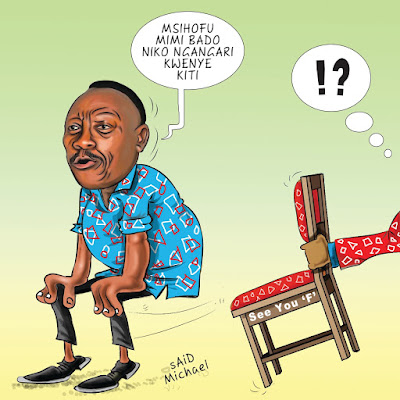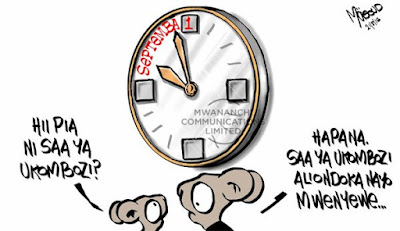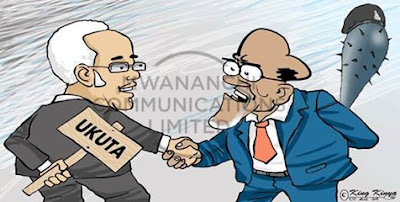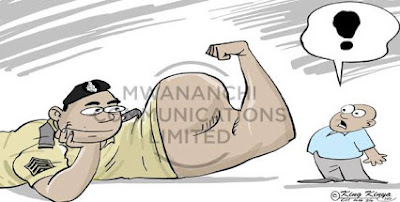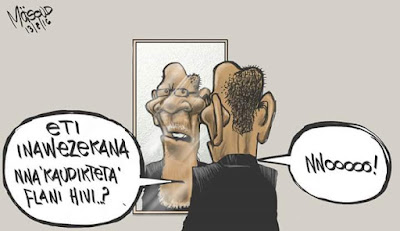Rais Magufuli amemwelewaje Profesa Mkumbo?
Chambi Chachage
Profesa wa Saikolojia ya Elimu, Kitila Mkumbo, amemwagiwa sifa kemkem na Rais wetu, Dakta John Magufuli. Tukio hili la aina yake lilitokea katika viwanja vya Chuo Kikuu cha Dar es Salaam tarehe 2 Juni 2016. Ni jambo linalostahili pongezi pale kazi ya kiuwanazuoni inaponukuliwa na hivyo kuzingatiwa na watawala na watunga sera.
Katika hotuba hiyo iliyojaa vijembe dhidi ya Wabunge waliotolewa Bungeni majuzi kufuatia sakata la kung’ang’ania Bunge lijadili sakata la kurudishwa nyumbani kwa baadhi ya wanafunzi wa Chuo Kikuu cha Dodoma (UDOM), Rais Magufuli anasema:
“Nataka nizungumze hapa hadharani. Unajua pamekuwa na wanasiasa wengine wana maneno. Wanataka tupeleke watu, wakachukue Digrii, mafelia. Sijui kwa sababu wanasiasa hawa ni mafelia? Ukiangalia kwenye ripoti iliyoandikwa na Profesa Mkumbo, mwanachama mzuri wa ACT, alizungumza wanafunzi wasizidi 1,800 ambao wangeweza wakaenda kwenye special training, hatukumsikiliza. Tumepeleka 7,802. Wengine ni Divisheni 4. Wako wengini Divisheni 3. Na wachache sana Divisheni 1 na Divisheni 2 – kwenda Chuo Kikuu cha UDOM.”
Kuhusu kilichopeleka Profesa Mkumbo kutosikilizwa, Rais anatanabahisha:
“Nimezungumza na Profesa Kikula. Kasema alilazimishwa. Angefanyaje? Afukuzwe Chuo? Wanafunzi pale wamekaa. Ukweli hawana qualifications za kwenda kuchukua hata Diploma. Kwa sheria tulizojiwekea kama nchi, ukimaliza Form 4, ukipata Divisheni 1 au 2 unaenda Form 5 au Form 6. Au unaweza ukaenda kuchukua Certificate. Ukimaliza kuchukua Certificate utaenda kuchukua Diploma. Certificate ni miaka miwili. Diploma ni mwaka mmoja. Tiyari ni miaka mitatu. Ni hiyo hiyo. Lakini cha ajabu zaidi, wale wanafunzi wanasoma pale Diploma, kwenye vyuo vya ualimu vile kumi havina wanafunzi. Nenda Kleruu. Nenda Butimba. Nenda wapi. Havina wanafunzi wa kutosha. Na baadaye nao, walipoona shida shida pale wakaanza mwongozo wa mgomo mgomo, ikanisaidia mimi kujua kuna nini pale. Unajua kuna migomo mingine ya haki haki, kuna migomo mingine inasaidia kuondolewa tu. Ndipo nikaja nikajua qualifications zilivyo. Nikasema hawa watu lazima waondoke. Na nilikuwa nasubiri Chuo Kikuu cha Dodoma nao wagome, wote wangeondoka! Ni lazima tujenge principles za kujenga heshima ya nchi yetu. Nimeshukuru wale vijana wameondoka. Wanasiasa hao hao, ati hawa vijana wamekosa pa kulala, wamefanya nini. Nonsense. Taifa letu tuliweke mbele kwanza, siasa zije nyuma. Na ndiyo maana mimi namsifia hapa Profesa Mkumbo pamoja ya kwamba ni wa ACT na mimi ni CCM, kwa sababu alitoa mwongozo mzuri. Ifike mahali Watanzania tukubali ukweli. Tuache siasa kwenye masuala ya msingi.”
Swali la kujiuliza hapa ni: Je, Profesa Kikula hakuzingatia kitu chochote alichosema Profesa Mkumbo kwa sababu alishinikizwa na “wakubwa” waliokuwa katika Serikali ya Awamu ya Nne ya Rais Mstaafu Kikwete? Wadadisi wa mambo tumepata fursa ya kumhoji kwa undani Profesa Mkumbo leo kuhusu ripoti hiyo waliyoiwasilisha mwezi Septemba 2014. Majibu tuliyoyapata yanatufanya tubaki na maswali mengi kichwani.
Mosi, kwa hakika timu ya Profesa Mkumbo iligundua kwamba mwaka 2014 UDOM ilikuwa na rasilimali – yaani walimu, maabara, madarasa na fedha – zinazotosha kudahili wanafunzi 1080 tu. Lakini pia ilisisitiza kwamba kama UDOM inataka kudahili seti nyingi zaidi ya idadi hiyo, basi itabidi ziendane na uwiano wa vipindi vya ufundishaji vitakavyokuwa vinafanyika kwa siku. Kwa maana hiyo, kama ikitaka kudahili seti mbili – yaani maradufu – ili wawe wanafunzi 2160 basi ingebidi kuwe na vipindi viwili kwa siku. Kanuni hii ya ukokotoaji iliwafanya wahitimishe kwamba itabidi UDOM iongeze rasilimali maradufu, au hata mara tatu, kwa kadri ya idadi ya wanafunzi itakaotaka kuwadahili. Kwa mantiki hiyo, tunaweza kusema ingehitajika kuongeza rasilimali takribani mara saba ili kuwadahili wanafunzi wapatao elfu 7.
Pili, timu ya Profesa Mkumbo iligundua kwamba kulikuwa na maabara manne ya sayansi ambayo ujenzi wake ulikuwa bado haujakamilika. Hivyo, wakapendekeza kwamba ujenzi uharakishwe. Kwa maana nyingine, tunaweza kusema kuongezeka kwa rasilimali hizi kungeweza kuiwezesha UDOM kuongeza idadi ya wanafunzi.
Tatu, akina Profesa Mkumbo waligundua kwamba walimu waliokuwepo wakati huo – yaani 171 – wanatosha kufundisha tu wanafunzi wapya 1,080 kwa uwiano wa 1: 6. Hivyo walipendekeza waongezwe kwa kuwa walikuwa wanafundisha wanafunzi wengine pia. Lakini kwa mantiki hiyo hiyo, tunaweza kusema bado ingebidi UDOM iongeze rasimali watu ili kukidhi hitaji la kuongeza zaidi udahili wa wanafunzi hao.
![]()
“Kuanzia Novemba 2014, Chuo Kikuu cha Dodoma kilianza kupokea wanafunzi wa kusomea stashahada maalum ya diploma ya Elimu, Sayansi, Hisabati na Tehama (DE-SMICT). Lengo kubwa la programu hii maalum ni kutimiza azma ya serikali kupunguza ama kuondoa kabisa tatizo la walimu wa sayansi katika shule za sekondari nchini. Serikali iliamua kuwaleta wanafunzi hawa Chuo Kikuu cha Dodoma (UDOM) badala ya ku[wa]peleka kwenye vyuo vya ualimu ikiamini kwamba UDOM kuna miundombinu ya kutosha hasa majengo na [rasilimali watu] ya kutosha kuweza kuhifadhi wanafunzi hao. Menejimenti na jumuiya nzima ya UDOM iliona ni heshima kupewa jukumu hili na kulipokea kwa mikono miwili. Kukubaliwa na kupokelewa jukumu hili UDOM ililazimika kujipanga upya kimkakati, kimfumo pamoja na kufanya mabadiliko kadha wa kadha katika utendaji wake wa kila siku ili kuweza kuhimili jukumu hili kubwa la kitaifa. Mojawapo ya hatua zilizochukuliwa ilikuwa kuunda Kikosi Kazi (Steering Committee-SC) cha kushauri namna ya kukabili jukumu hili.”
THTU kinaendelea kusisitiza kwamba kabla “ya kuanza kufundisha, SC ilipendekeza mikakati, mifumo na mabadiliko yaliyokuwa ya msingi ili kukabili swala hili. Changamoto kubwa, ilibainika ni, ufundishaji wa hawa vijana. Masuala mengine yahusuyo malazi na malezi kwa ujumla wake yaliandaliwa ingawa hayakuwa na changamoto kubwa kama suala la UFUNDISHAJI. Suala la ufundishaji lilihitaji jicho la pekee kwani vijana hawa waliopokelewa ndiyo kwanza wamemaliza kidato cha nne, hivyo bado ni wadogo kwa kiasi fulani na pia hawakupaswa kufundishwa kama wenzao wanaosomea masomo ya shahada na kuendelea.”
Kuhusu udahili wa awali, THTU inasema: “Vijana takriban 2000 walipokelewa, wakafundishwa na (semester) [muhula] wa kwanza ukamalizika vizuri bila migogoro mikubwa.” Kama idadi hii ni sahihi, basi tofauti yake na kilichoshauriwa na akina Profesa Mkumbo ni wanafunzi 920. Lakini kama rasilimali ziliongezeka katika kipindi hicho cha miezi mitatu, je, tunaweza kuhitimisha hawakumsikiliza Profesa?
Na, je, huu mfumo wao wa kuwagawa haushahibiani na lile pendekezo la Profesa Mkumbo: “Masomo yote ya UALIMU yawe na wanafunzi 120 katika mkondo mmoja”; “Masomo yote ya SAYANSI ASILIA yawe na wanafunzi 80 kwa mkondo mmoja”; “Masomo yote ya TEHAMA yawe na wanafunzi 60 kwa mkondo mmoja”?
Kwa mujibu wa THTU, tatizo lilianza hivi: “Kutokana na ufanisi uliopatikana katika mwaka wa masomo 2014/15, Serikali na UDOM waliamua kuleta tena wanafunzi wengine kwa muhula wa 2015/16. Idadi ya hawa wanafunzi ni takriban 6000. Kulingana na idadi hii kuwa kubwa mno, upatikanaji wa waalimu wa sayansi wanaoweza kuenea/kutosha mikondo yote iliyogawanywa ulishindikana.”
Lakini, je, Profesa Mkumbo alisema haiwezekani kudahili wanafunzi 6000? Au alisema ukitaka kudahili wanafunzi wengi inabidi uongeze rasilimali kadri unavyowaongeza, yaani, kwa uwiano stahiki? THTU inadai kwamba jitihada zifuatazo za kuiongezea UDOM uwezo zilifanyika ila zikagonga mwamba:
“Ili kuhakikisha kuwa wanafunzi hawarudi nyumbani wala kwenda barabararani, uongozi wa CNMS [Koleji ya Sayansi Kavu na Hisabati] ulijitahidi kuushirikisha uongozi wa chuo na kuomba msaada kila palipoonekana kuhitajika msaada huo. Baadhi ya maswala muhimu yaliyotakiwa kushuhulikiwa ni kuwaongezea uwezo wa kupata waalimu wa ziada, kupata sehemu za kufundishia na kupata vifaa vya maabara. Hata tunapoandika hivi sasa, DVC-PFA, pamoja na kupokea nyaraka mbali mbali zinazomwomba aagize vifaa na madawa ya maabara (laboratory equipments and reagents) hajanunua hata kitu kimoja. Wanafunzi wamefundishwa bila kupewa mazoezi ya vitendo yanayokidhi mahitaji kwa sababu za kiburi cha DVC-PFA. Katika jitihada za kutafuta waalimu wa ziada, DVC-ACR amekataa katakata kutoa mwongozo wa kimaandishi ama ushauri wowote utakaowasaidia viongozi wa CNMS kuboresha hali ya ufundishaji.”
Jumuiya ya Wanataaluuma wa Chuo Kikuu cha Dodoma (UDOMASA) nayo inadai:
“Mgogoro huu umepotoshwa kutokana na ukweli kwamba [walimu] wanalazimika kufundisha historia ya [sayansi] badala ya sayansi kwa vitendo.Ukosefu wa nafasi na vifaa vya maabara ni tatizo kubwa ambalo limelalamikiwa kwa muda mrefu lakini hoja inayoonekana zaidi ni malipo ya waalimu. Mfano katika Chuo cha Sayansi Asilia na Mahesabu kinachohusika na masomo ya Fizikia, Kemia, Baolojia na Hesabu maabara zake hazina vifaa vya kutosha kukidhi mahitaji ya ufundishaji pamoja na koleji husika kutuma maombi karibu kila mwaka.”
Katika mazingira haya, ni vigumu kwa wadadisi wa mambo kuamini kwamba wanafunzi waliorudishwa nyumbani wamerudishwa kwa sababu akina Profesa Kikula hawakumsikiliza Profesa Mkumbo kuhusu kudahili wanafunzi 1080. Tunachoona ni kwamba Serikali haikusikiliza ushauri wake kuhusu kuongeza rasilimali za kutosha.
Matokeo yake wanaodaiwa kuwa “wanafunzi hewa” wanatumbuliwa hata kabla Waziri wa Elimu hajajiridhisha kikamilifu. Kama umakini mkubwa wa kujiridhisha umefanyika, kwa nini Rais Magufuli amesema maneno haya jana: “Ninafahamu Profesa Ndalichako anapitia ili orodha ya vijana wa UDOM waliofaulu, Divisheni 1 na Divisheni 2, tutahakikisha tunawetengenezea mazingira ya kwenda kusoma. Waliofeli wakatafute mbinu nyingine za kujiunga na vyuo vyenye saizi yao”?
Hata kama kuna waliomo na wasiokuwemo, waliofeli na waliofaulu, ni pedagojia gani hiyo inayofundisha kusimanga wanafunzi hadharani kuwa ni “vilaza”? Hivi Saikolojia ya Elimu aliyoibobea Profesa Mkumbo inasema nini kuhusu hili? Ni udhaifu kwa Serikali kukiri kosa na kuomba msamaha? Ni nini hasa kimepelekea uharaka huu wa kuwarudisha nyumbani vijana kana kwamba walijidahili wenyewe?
Je, hizi ni zama za hapa kazi tu au hapa kasi tu?



















































